20 years ago, on the 1st of December, World AIDS Day, AFEW was officially established to promote health and increase the access of key populations to prevention, treatment and care for major public health concerns such as HIV, TB, viral hepatitis, and sexual and reproductive health in Eastern Europe and Central Asia.
In this anniversary interview, Anke van Dam, executive director of AFEW International, told us about AFEW’s work these last 20 years, important projects, achievements, missed opportunities and her most memorable experience working at AFEW.
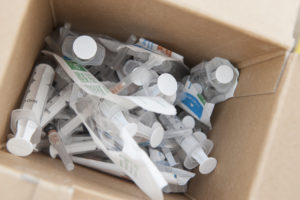 Anke, AFEW started its work 20 years ago. What was happening in Eastern Europe and Central Asia at that time?
Anke, AFEW started its work 20 years ago. What was happening in Eastern Europe and Central Asia at that time?
At the end of the 90s there was an outbreak of cases of HIV among people who inject drugs in Russia. At that time there were hardly any activities to support people living with HIV, or to prevent new cases. That is how it all started. Harm reduction activities in support of people who inject and who use drugs started by introducing clean needles and syringe exchange program, and we opened discussions about opiate substitution treatment. 20 years ago, AIDS Foundation East-West was established to scale up these good practices of HIV prevention, treatment and care! There was a window of opportunity, the international and national communities felt that we could stop HIV in Eastern Europe and Central Asia (EECA). There were already so many lessons learnt from other countries, lessons that we could use for our work. Russia was and still is one of the countries in the region with most HIV cases. At that time, Russia was more open to new ideas and interventions from other countries, so harm reduction activities could be introduced. After Russia, our harm reduction activities also started in Ukraine, Kazakhstan and other countries in the region.
The EECA region faces three, and now with COVID-19, four epidemics. Next to HIV, TB and multi-drug resistant tuberculosis are a big problem in the region. Viral hepatitis, specifically hepatitis B and C, are highly prevalent among the group of people who inject drugs. Pretty soon after we launched our projects to stop HIV, we included tuberculosis (TB) and viral hepatitis as public health concerns to our activities. On top of that, nowadays we have to deal with COVID-19, which is a huge burden on health systems; the key groups in society that we work with don’t get the care and support they need.
When and how was AFEW established?
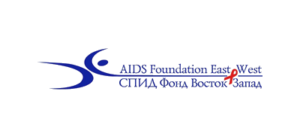 Due to the outbreak of HIV among people who inject drugs in Moscow as I mentioned above, Doctors Without Borders (Médecins Sans Frontières, MSF) started activities to prevention, treatment and care for HIV as an emergency aid. That was in 1996 and MSF introduced harm reduction activities for people who inject drugs. At the start, MSF had an office only in Moscow, but slowly they expanded their activities to Ukraine, Kazakhstan, Kyrgyzstan, and Tajikistan. At that time, it was a new intervention for Eastern Europe and Central Asia. In 2000 few MSF workers who started several HIV prevention programs in Russia for MSF decided to found a new organization, allowing them to expand their successful activities in the whole region. AFEW, Aids Foundation East-West, with headquarters in Moscow and with branches in other countries, was established. In 2007, it was decided that the headquarters should move to Amsterdam to intensify the relationships with donors, such as the Dutch Ministry and European Commission. Since 2013 the local branches, country offices, became independent NGOs and together we formed the AFEW Partnership.
Due to the outbreak of HIV among people who inject drugs in Moscow as I mentioned above, Doctors Without Borders (Médecins Sans Frontières, MSF) started activities to prevention, treatment and care for HIV as an emergency aid. That was in 1996 and MSF introduced harm reduction activities for people who inject drugs. At the start, MSF had an office only in Moscow, but slowly they expanded their activities to Ukraine, Kazakhstan, Kyrgyzstan, and Tajikistan. At that time, it was a new intervention for Eastern Europe and Central Asia. In 2000 few MSF workers who started several HIV prevention programs in Russia for MSF decided to found a new organization, allowing them to expand their successful activities in the whole region. AFEW, Aids Foundation East-West, with headquarters in Moscow and with branches in other countries, was established. In 2007, it was decided that the headquarters should move to Amsterdam to intensify the relationships with donors, such as the Dutch Ministry and European Commission. Since 2013 the local branches, country offices, became independent NGOs and together we formed the AFEW Partnership.
Why were the Netherlands so interested in funding harm reduction in the EECA region?
The Netherlands have been one of the front-runners for harm reduction in the world and they had a lot of experience in implementing harm reduction in the Netherlands, with very good results. They supported the idea that the knowledge and expertise built up in the Netherlands should be introduced to other countries. At that time HIV was high on the political agenda of the Dutch Government and the Dutch Ministry of Foreign Affairs. Harm Reduction measures were the right way to stop new infections among people who use drugs!
Has AFEW´s mission changed over the years?
We always have affiliated ourselves as a public health organization with the goal of improving access to quality health services, in the beginning mostly HIV related health services. Over these last 20 years our mission has changed into a mission with much more focus on key populations at risk for HIV, TB and viral hepatitis. This also means with a bigger focus on stopping stigma and discrimination and promoting social justice.
What has AFEW achieved in these 20 years?
I think that there are three things that we can be proud of. Firstly, we introduced harm reduction to EECA. Secondly, we introduced a client management system with a person-centered approach. According to that system, the patient is at the center of the healthcare services, the needs of each client is the starting point of every health service provision. And thirdly, we helped establish many civil society organizations, like harm reduction NGOs, People living with HIV NGOs and networks, and community-based organizations run by people who use drugs. We built up their capacity to make them as strong as they are now.
What about missed opportunities of AFEW?
I would say we have not celebrated our successes enough and not communicated them that well. We are workers and do-ers. Once we have a project, we implement it, we do our work well, and when it’s finished, we move on to another project. We have so many results achieved to be proud of that it is a pity that we didn’t let the world know enough about these.
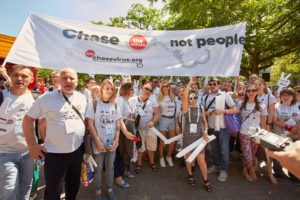 Which projects are you most pleased with?
Which projects are you most pleased with?
The “Bridging the gaps: health and rights for key populations” project, funded by the Dutch Ministry of Foreign Affairs is our biggest and most well-known project. It lasted for 10 years and we achieved so much in that time. We will celebrate our successes on the 9th of December when we close this project.
During my time working for AFEW, we have had a lot of other interesting and very important projects. Our prison health projects stand out for me. In these projects we train prisoners to become peer educators, we train staff and guards about communicable diseases and human rights and we help improving the conditions for detainees. I think that it’s very important to demand attention for them, because not a lot of organizations care about prisoners. I’m proud that we have done a great job in this field.
The Emergency Support Fund is another important project of ours. With small grants we, together with Aidsfonds, support organizations representing key populations in surviving in emergency situations. This can be an emergency due to legal barriers, stigma and discrimination, financial challenges and political restrictions.
In November 2019 we organized the first EECA INTERACT Workshop in Almaty, Kazakhstan. Our goal was to build scientific research capacity while simultaneously strengthening clinical, prevention, and research networks across the EECA region. We wanted to bring young and bright researchers together with top scientists, clinicians, and policymakers to ignite conversations that would build a stronger scientific base to serve the region and connect to the world. That was a very successful event.
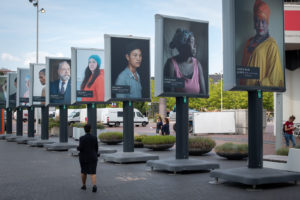 I also see our activities in getting the EECA region engaged at the AIDS conference in 2018 as one of our big successes. We managed to bring many scientists, policy makers, activists from the EECA region to Amsterdam to share, link, learn and network. There, we shone a spotlight on the region, and at all levels asked for more attention to be given to Eastern Europe and Central Asia.
I also see our activities in getting the EECA region engaged at the AIDS conference in 2018 as one of our big successes. We managed to bring many scientists, policy makers, activists from the EECA region to Amsterdam to share, link, learn and network. There, we shone a spotlight on the region, and at all levels asked for more attention to be given to Eastern Europe and Central Asia.
What have been the biggest challenges for AFEW and how did you overcome them?
The biggest challenge has always been funding. There is so little attention and so little money for Eastern Europe and Central Asia. In 2008 we faced a difficult period and suffered as many others from the financial crisis. We had to reduce our staff by half. We reorganized our organizational structure to become more agile and flexible. Nowadays we are again facing a situation where we see many donors withdrawing and reducing their funding.
For the rest, we didn’t have a lot of challenges. We have never had trouble receiving government permission to implement our projects. We always build good relationships with governments and local authorities.
Why do you personally like working in the EECA region?
I am fascinated by the culture, the history, the beauty and the people of the EECA region. Literature, cinema, ballet, I enjoy it all very much. There are many misconceptions about Eastern Europe and Central Asia, it is perceived as the underdog of all regions in the world. That is also attractive to me, I care for the ones that are left behind ?, it makes me a missionary and promote the EECA region to colleagues and friends.
What has been your most memorable experience working at AFEW International so far?
Once, in Russia, I met an ex-prisoner. He got arrested because of drug possession – marijuana– and had to go to prison. We had a conversation and he told me that he was a healthy man when he entered prison. But when he left, he had HIV, tuberculosis, viral hepatitis. In prison he also became addicted to drugs. Then he thanked us, AFEW, for getting his life in order again. He was able to get treatment for TB and HIV in prison and he continued when he was released. That story impressed me a lot, because he was arrested for a couple of grams of marijuana, but it effected his life so badly. With our support he could overcome and live with his illnesses.
What does AFEW mean to the region?
I think that we are meaningful to the region because we raise awareness about the significant needs of support to civil society organizations in the EECA region. AFEW is part of many networks, alliances and other advocacy groups which allows us to advocate for political and donor attention. Furthermore, I hope that people and the organizations in the region also see AFEW as a reliable partner that always tries to help. Our partners can always reach out to us. We listen to them, even in hard times.
Have AFEW´s activities been appreciated by national and local governments?
Yes, definitely. A common way of appreciation for work in the EECA region is to give certificates and diplomas. We received many, from Kazakhstan, Kyrgyzstan. Our way of working is bringing authorities and civil society organizations together, facilitating the dialogue. We always reach out to local authorities and governments to inform them about what we are going to do, to ask for their involvement, and to ensure that it´s sustainable. The Dutch government recognized our role for development cooperation in the EECA region by giving us the important assignment to engage the EECA region in the International AIDS Conference in 2018 in Amsterdam
UN institutes, UNAIDS, UNICEF also appreciate our work. I think in general we have a good name, a good reputation and people indeed appreciate what we are doing.
What makes AFEW unique?
We are unique because we are the only Dutch organization which is really concerned about the needs of people in Eastern Europe and Central Asia. We are the connectors between East and West and working with the key populations most at risk for public health concerns like HIV. We are the only Dutch one!
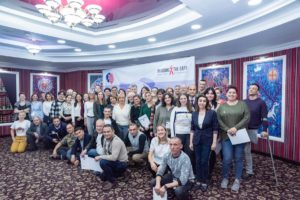 What does AFEW mean for you, personally?
What does AFEW mean for you, personally?
For me, AFEW is really a big family and a warm bath where I can do my work with so many nice colleagues. I´ve had the opportunity in AFEW to meet a lot of people that are so passionate and committed to make the world a better place. I also got an opportunity to get to know Eastern Europe and Central Asia much better, a region so beautiful and so rich in history.
I realized that it really matters where you are born. It really matters also which things cross your path in life. One can make a difference and help someone to enjoy life again.
I’m very proud of what we have achieved. I’m proud that we are recognized as a reliable, trustworthy partner. We have empowered people and organizations in the region to know their rights and to advocate for them, to take care of their own health, and therefore to be able to take better care of their families.




